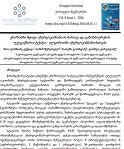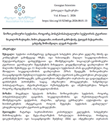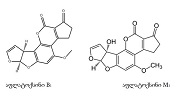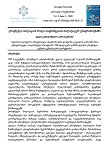Determining the degree of soil and water pollution from uncontrolled landfills (in the lower basin of the Aragvi River, Natakhtari territory)
Downloads
Uncontrolled landfills are a problem of the whole world and naturally of Georgia. They are found in river valleys and near settlements, which pose a threat to the population. Household waste, fecal masses, pesticides, polyethylene and others that pollute the soil and water fall on them. In the valley of the Aragvi river, near the village of Natakhtari, in the vicinity of food facilities and fish farms, there are many uncontrolled garbage dumps. Pollutants leached from them are found in soil and water. Finally, they flow into the Aragvi River, from which 60% of the Tbilisi reservoir is supplied. Microbiological analysis of water showed a high level of pollution, in particular, Escherichia Coli (E.coli) bacteria was found. This bacterium causes diarrhea, urinary tract infections, pneumonia, and more. The disease most often develops in children. Hemolytic uremic syndrome (HUS) is common among them. During the development of this disease, there is a risk of kidney failure. A soil survey for heavy metals revealed a high concentration of lead. Lead has a negative effect on human health. It easily gets into water and soil. Its main sources are automobile exhaust, paints, fertilizers and pesticides, industrial wastes, and others that are abundant in landfills. After lead enters the body, it is distributed in the bones, kidney and nervous system. Most often, the effects of lead are found in children, which manifest in behavioral problems, learning disabilities, and decreased IQ.
Downloads
გ. ავქოფაშვილი, 2018. დისერტაცია „ტექნოგენურად დაბინძურებულ ნიადაგებზე მძიმე ლითონთა ფიტომიგრაცია. ივ.ჯავახიშვილის სახელობის თბილისის სახელმწიფო უნივერსიტეტი.
ლ. მარუაშვილი 1964. საქართველოს ფიზიკური გეოგრაფია
ნ. ბუაჩიძე, 2015 საქართველოში არსებული სტიქიური ნაგავსაყრელების გავლენის შეფასება მიმდებარე ტერიტორიების ეკოსისტემების მდგომარეობაზე.
ნ. ვეფხვაძე, 2009, პრევენციული მედიცინა.
Copyright (c) 2023 GEORGIAN SCIENTISTS

This work is licensed under a Creative Commons Attribution-NonCommercial-NoDerivatives 4.0 International License.


























































































































































































































